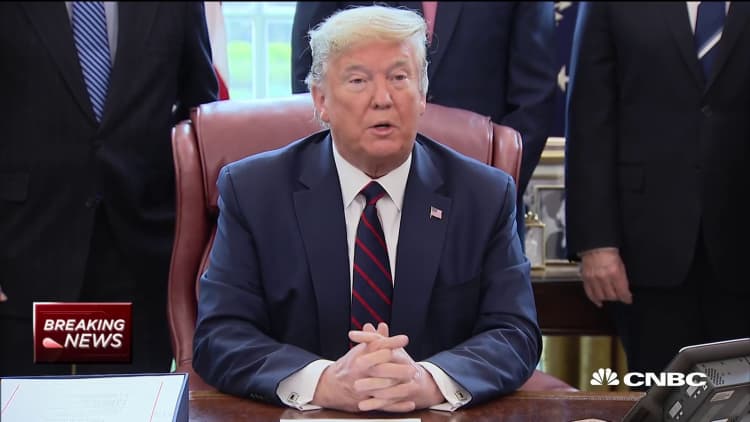President Donald Trump said Saturday he will not seek to impose a quarantine on New York, New Jersey and certain parts of Connecticut, after floating the idea earlier in the day as way to contain the coronavirus from spreading out of hot spots where the disease has taken a particularly heavy toll.
Trump said he decided a quarantine wasn't necessary after consulting with the White House task force and the governors of the three states. He has asked the Centers for Disease Control to issue a strong travel advisory, which will be administered by the governors in consultation with the federal government.
The CDC is urging residents of New York, New Jersey and Connecticut to refrain from nonessential domestic travel for the next 14 days effective immediately. The advisory does not apply to critical industries such as trucking, health professionals, financial services and food supply. The governors of the three states have full discretion to implement the travel advisory, the CDC said.
Earlier Saturday, Trump said he was considering a two-week quarantine on the three neighboring states and would make a decision later on Saturday, though his authority to impose such a measure was disputed from the beginning.
"I'm thinking about that right now. We might not have to do it but there's a possibility that sometime today we'll do a quarantine," Trump told reporters at the White House Saturday. "Short-term, two week on New York, probably New Jersey and certain parts of Connecticut."
Gov. Andrew Cuomo, in an interview with CNN, said that preventing people from moving in and out of the tri-state would amount to a federally imposed lockdown, which he believes is illegal.
"A lockdown is what they did in Wuhan, China," Cuomo said. "We're not in China, and we're not in Wuhan. I don't believe it would be legal. I believe it would be illegal."
Cuomo said he did not believe that Trump intended to impose a sweeping quarantine on the region but suggested he could sue if the administration did follow through.
"I've sued the federal government a number of times over the years. I do not believe it's going to come to that on this," Cuomo said. "This would be a declaration of war on states, a federal declaration of war."
The federal government does have the authority to detain and medically examine individuals who are believed to have a communicable disease, but the law is less clear on imposing a quarantine for an entire region.
The governors in the tri-state region said they were in the dark about Trump's possible quarantine. Cuomo said that while he spoke with the president Saturday morning, a quarantine didn't come up during their discussions. New Jersey Gov. Phil Murphy told reporters on Saturday that Trump did not bring up a possible quarantine when they spoke on Friday.
"Nothing like quarantine came up," Murphy said. "I literally saw the story as I was walking into this room. I've got no more color on it."
Connecticut Gov. Ned Lamont has said the tri-state governors were already implementing certain quarantine measures. Lamont said he wanted to speak "to the president directly about his comments and any further enforcement actions, because confusion leads to panic."
When NBC News asked White House Chief of Staff Mark Meadows what legal authority the administration has to order a quarantine, Meadows replied, "We're evaluating all the options right now."
Talk of a possible quarantine comes as New York and the surrounding states have borne the brunt of the infected cases in the U.S. More than 121,000 people have been diagnosed with coronavirus in the United States, and at least 2,000 people have died, according to Johns Hopkins University. New York, New Jersey and Connecticut have become the center of the outbreak in the U.S. New York has more than 52,000 cases and at least 728 deaths; New Jersey has reported more than 11,000 cases and 140 deaths; and Connecticut has confirmed 1,291 cases and 27 deaths.




